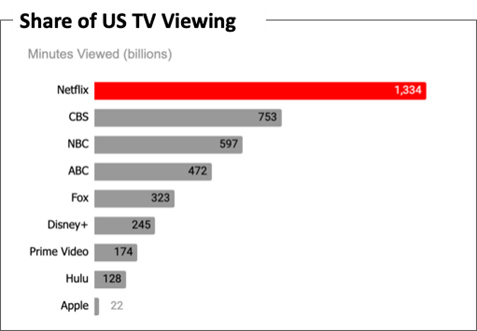Netflix Viewing Tops All Broadcasters in 2021-22 Season
Viewers spent 1.3 trillion minutes with Netflix shows in the last season, nearly matching the top two broadcast networks combined

LOS GATOS, Calif.—Faced with mounting pressure from investors worried about ongoing sub losses, Netflix released extensive viewing data along with its Q2 2022 earnings report that was designed to show how popular the beleaguered streaming giant remains among viewers.
That data shows that Netflix is now by far the most popular viewing platform in the U.S. television landscape.
“In the US, which is one of the most competitive markets in the world, we drew more TV viewing time than any other outlet during the 2021-22 TV season, nearly matching the combined total of the two most watched broadcast networks,” the letter to shareholders said. “And, as Nielsen will announce on Thursday, our share of U.S. TV viewing reached an all-time high of 7.7% in June (vs. 6.6% in June 2021), demonstrating our ability to grow our engagement share as we continue to improve our service.”

During the 2021-2022 season, Netflix cited Nielsen data showing that 1.334 trillion minutes were viewed on its platform, way more than CBS (753 million), NBC (597 million), ABC (472 million), and Fox (323 million.)
The 1.3 billion minutes viewed were also exponentially larger than the nearest streaming competitors (Disney+ at 245 million minutes, Prime Video at 174 million and Hulu at 128 million).
The company also reported that in its first four weeks, the hit Netflix original Stranger Things season four generated 1.3 billion hours viewed
Get the TV Tech Newsletter
The professional video industry's #1 source for news, trends and product and tech information. Sign up below.
George Winslow is the senior content producer for TV Tech. He has written about the television, media and technology industries for nearly 30 years for such publications as Broadcasting & Cable, Multichannel News and TV Tech. Over the years, he has edited a number of magazines, including Multichannel News International and World Screen, and moderated panels at such major industry events as NAB and MIP TV. He has published two books and dozens of encyclopedia articles on such subjects as the media, New York City history and economics.

